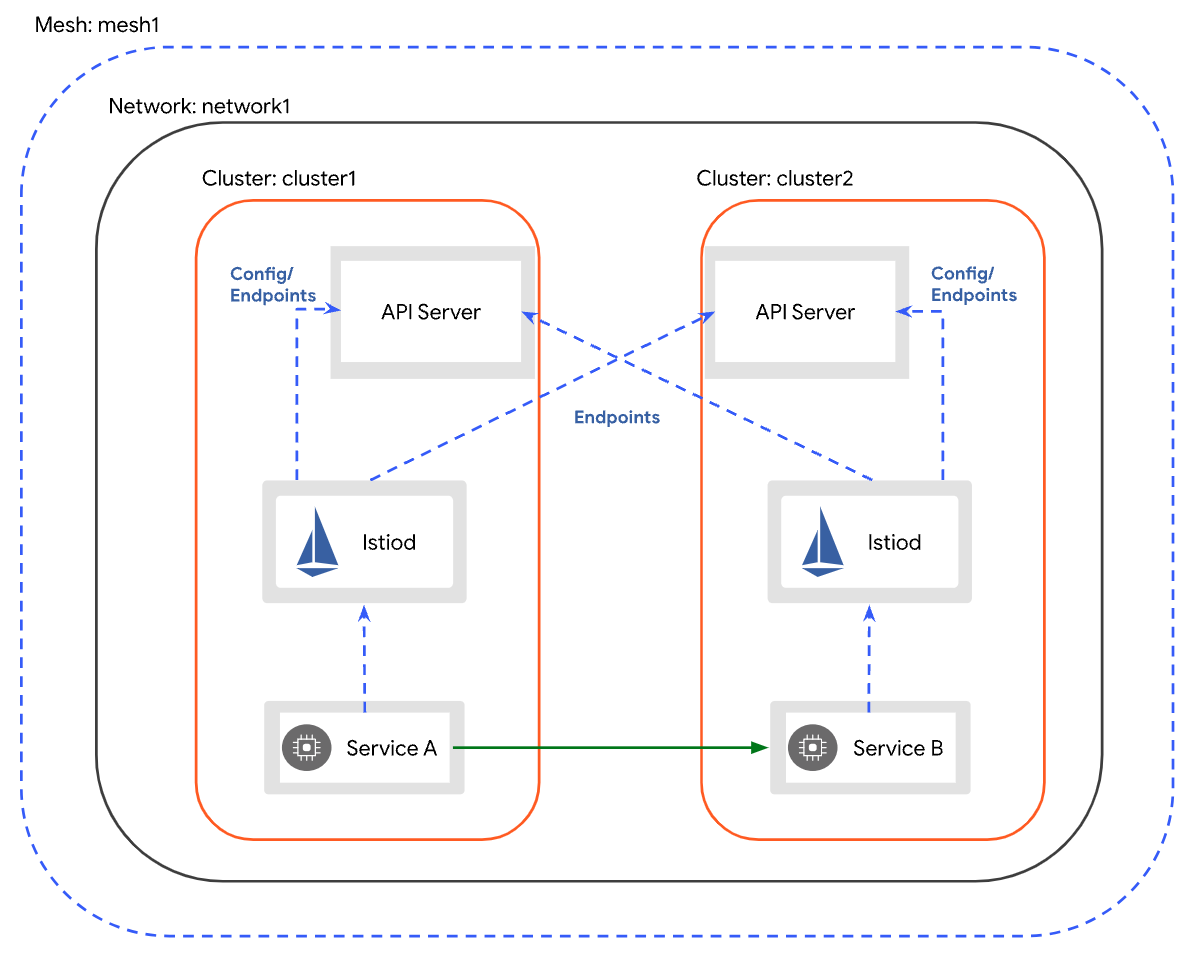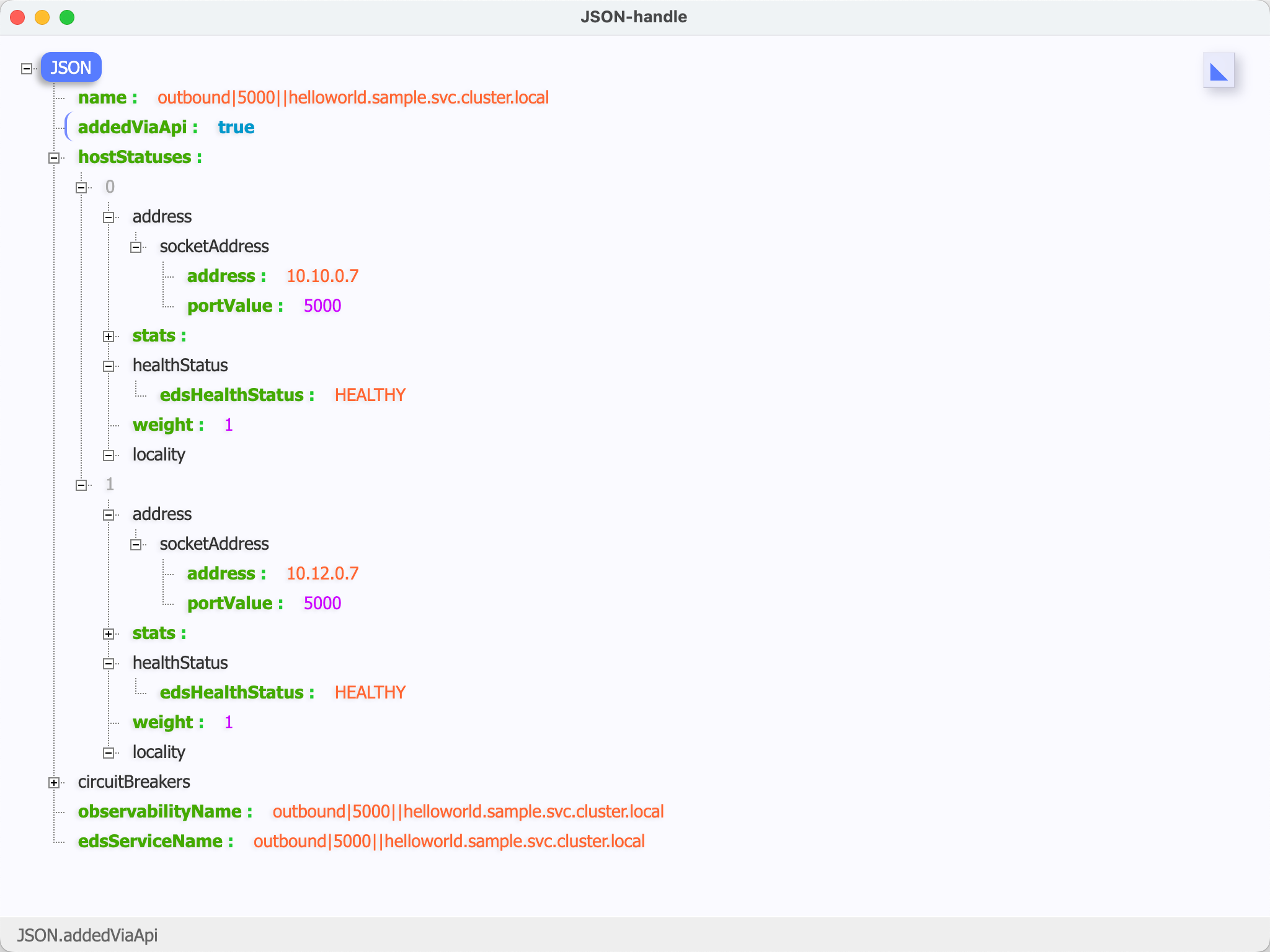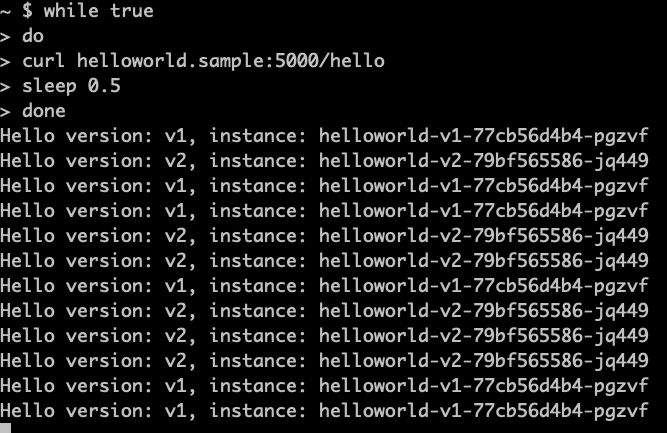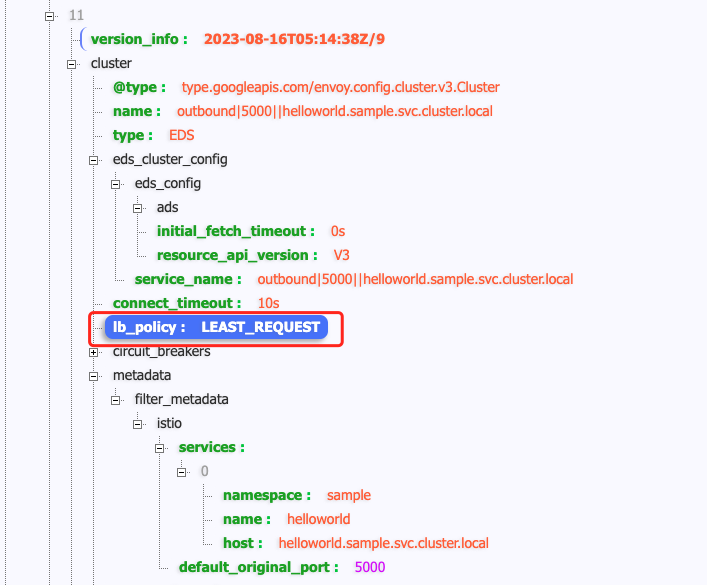(
本文基于Istio 1.16.2,k8s 1.24
创建两套k8s集群
1
2
3
4
5
6
7
8
9
10
11
12
13
14
15
16
17
18
19
20
21
22
23
24
25
26
27
28
29
30
31
32
33
34
35
36
37
38
39
40
41
mkdir -p multicluster
cd multicluster
cat << EOF > kind-cluster1.yaml
kind : Cluster
apiVersion : "kind.x-k8s.io/v1alpha4"
networking :
apiServerAddress : "172.26.128.224"
podSubnet : "10.10.0.0/16"
serviceSubnet : "10.11.0.0/16"
nodes :
- role : control-plane
image : registry.cn-hangzhou.aliyuncs.com/seam/node:v1.24.15
- role : worker
image : registry.cn-hangzhou.aliyuncs.com/seam/node:v1.24.15
kubeadmConfigPatches :
- |
kind: JoinConfiguration
nodeRegistration:
kubeletExtraArgs:
node-labels: "topology.kubernetes.io/region=sg,topology.kubernetes.io/zone=az01"
EOF
cat << EOF > kind-cluster2.yaml
kind : Cluster
apiVersion : "kind.x-k8s.io/v1alpha4"
networking :
apiServerAddress : "172.26.128.224"
podSubnet : "10.12.0.0/16"
serviceSubnet : "10.13.0.0/16"
nodes :
- role : control-plane
image : registry.cn-hangzhou.aliyuncs.com/seam/node:v1.24.15
- role : worker
image : registry.cn-hangzhou.aliyuncs.com/seam/node:v1.24.15
kubeadmConfigPatches :
- |
kind: JoinConfiguration
nodeRegistration:
kubeletExtraArgs:
node-labels: "topology.kubernetes.io/region=sg,topology.kubernetes.io/zone=az02"
EOF
1
2
3
4
5
kind create cluster --name cluster1 --kubeconfig= istio-multicluster --config= kind-cluster1.yaml
kind create cluster --name cluster2 --kubeconfig= istio-multicluster --config= kind-cluster2.yaml
kubectl config rename-context kind-cluster1 cluster1 --kubeconfig istio-multicluster
kubectl config rename-context kind-cluster2 cluster2 --kubeconfig istio-multicluster
打通集群网络
1
2
3
4
5
6
7
8
9
10
11
12
13
14
15
16
17
18
19
20
21
#!/bin/bash
# add_routes will add routes for given kind cluster
# Parameters:
# - $1: name of the kind cluster want to add routes
# - $2: the kubeconfig path of the cluster wanted to be connected
# - $3: the context in kubeconfig of the cluster wanted to be connected
function add_routes() {
unset IFS
routes = $( kubectl --kubeconfig ${ 2 } --context ${ 3 } get nodes -o jsonpath = '{range .items[*]}ip route add {.spec.podCIDR} via {.status.addresses[?(.type=="InternalIP")].address}{"\n"}{end}' )
echo "Connecting cluster ${ 1 } to ${ 2 } "
IFS = $'\n'
for n in $( kind get nodes --name " ${ 1 } " ) ; do
for r in $routes ; do
echo $r
echo "exec cmd in docker exec $n $r "
eval "docker exec $n $r "
done
done
unset IFS
}
1
2
add_routes cluster1 istio-multicluster cluster2
add_routes cluster2 istio-multicluster cluster1
部署Istio
1
2
3
4
5
6
7
8
cd ../
export KUBECONFIG = ` pwd ` /multicluster/istio-multicluster
export CTX_CLUSTER1 = cluster1
export CTX_CLUSTER2 = cluster2
curl -L https://istio.io/downloadIstio | ISTIO_VERSION = 1.16.2 sh -
cd istio-1.16.2
export PATH = " $PATH :`pwd`/bin"
配置信任关系
生成根证书和密钥
1
2
3
mkdir -p certs
pushd certs
make -f ../tools/certs/Makefile.selfsigned.mk root-ca
root-cert.pem:生成的根证书 root-key.pem:生成的根密钥 root-ca.conf:生成根证书的 openssl 配置 root-cert.csr:为根证书生成的 CSR 每个集群,为 Istio CA 生成一个中间证书和密钥
1
2
make -f ../tools/certs/Makefile.selfsigned.mk cluster1-cacerts
make -f ../tools/certs/Makefile.selfsigned.mk cluster2-cacerts
ca-cert.pem:生成的中间证书 ca-key.pem:生成的中间密钥 cert-chain.pem:istiod 使用的生成的证书链 root-cert.pem:根证书 每个集群中,创建一个私密 cacerts
1
2
3
4
5
6
7
8
9
10
11
12
13
14
kubectl create namespace istio-system --context cluster1
kubectl create secret generic cacerts -n istio-system \
= cluster1/ca-cert.pem \
= cluster1/ca-key.pem \
= cluster1/root-cert.pem \
= cluster1/cert-chain.pem --context cluster1
kubectl create namespace istio-system --context cluster2
kubectl create secret generic cacerts -n istio-system \
= cluster2/ca-cert.pem \
= cluster2/ca-key.pem \
= cluster2/root-cert.pem \
= cluster2/cert-chain.pem --context cluster2
部署Istio
cluster1 设为主集群
1
2
3
4
5
6
7
8
9
10
11
12
13
cat <<EOF > cluster1.yaml
apiVersion: install.istio.io/v1alpha1
kind: IstioOperator
spec:
values:
global:
meshID: mesh1
multiCluster:
clusterName: cluster1
network: network1
EOF
istioctl install --context= " ${ CTX_CLUSTER1 } " -f cluster1.yaml
cluster2 设为主集群
1
2
3
4
5
6
7
8
9
10
11
12
13
cat <<EOF > cluster2.yaml
apiVersion: install.istio.io/v1alpha1
kind: IstioOperator
spec:
values:
global:
meshID: mesh1
multiCluster:
clusterName: cluster2
network: network1
EOF
istioctl install --context="${CTX_CLUSTER2}" -f cluster2.yaml
开启端点发现
创建secret,包含远端集群的 kubeconfig 配置,istio通过 istio/multiCluster=true 确认发现远端集群
1
2
3
4
5
6
7
8
9
10
istioctl x create-remote-secret \
= " ${ CTX_CLUSTER1 } " \
= cluster1 | \
= " ${ CTX_CLUSTER2 } "
istioctl x create-remote-secret \
= " ${ CTX_CLUSTER2 } " \
= cluster2 | \
= " ${ CTX_CLUSTER1 } "
1
2
3
4
5
6
# kubectl get secret -n istio-system istio-remote-secret-cluster2 --show-labels --context cluster1
NAME TYPE DATA AGE LABELS
istio-remote-secret-cluster2 Opaque 1 50s istio/multiCluster= true
# kubectl get secret -n istio-system istio-remote-secret-cluster1 --show-labels --context cluster2
NAME TYPE DATA AGE LABELS
istio-remote-secret-cluster1 Opaque 1 58s istio/multiCluster= true
验证跨集群访问
部署 helloworld 服务
创建名称空间并开启自动注入
1
2
3
4
5
6
7
kubectl create --context= " ${ CTX_CLUSTER1 } " namespace sample
kubectl create --context= " ${ CTX_CLUSTER2 } " namespace sample
kubectl label --context= " ${ CTX_CLUSTER1 } " namespace sample \
= enabled
kubectl label --context= " ${ CTX_CLUSTER2 } " namespace sample \
= enabled
Cluster1 部署V1版本
1
2
3
4
5
kubectl apply --context= " ${ CTX_CLUSTER1 } " \
\
version = v1 -n sample
kubectl get pod --context= " ${ CTX_CLUSTER1 } " -n sample -l app = helloworld
Cluster2 部署V2版本
1
2
3
4
5
kubectl apply --context= " ${ CTX_CLUSTER2 } " \
\
version = v2 -n sample
kubectl get pod --context= " ${ CTX_CLUSTER2 } " -n sample -l app = helloworld
部署 Sleep 服务
每个集群部署
1
2
3
4
kubectl apply --context= " ${ CTX_CLUSTER1 } " \
kubectl apply --context= " ${ CTX_CLUSTER2 } " \
确认服务正常
1
2
kubectl get pod --context= " ${ CTX_CLUSTER1 } " -n sample -l app = sleep
kubectl get pod --context= " ${ CTX_CLUSTER2 } " -n sample -l app = sleep
查看endpoint
1
2
3
4
5
6
7
8
9
10
11
12
13
14
15
16
17
18
19
# istioctl ps
NAME CLUSTER CDS LDS EDS RDS ECDS ISTIOD VERSION
helloworld-v2-79bf565586-jq449.sample cluster2 SYNCED SYNCED SYNCED SYNCED NOT SENT istiod-bf55d77c-6ttql 1.16.2
sleep-69cfb4968f-s5xtl.sample cluster2 SYNCED SYNCED SYNCED SYNCED NOT SENT istiod-bf55d77c-6ttql 1.16.2
# istioctl pc c helloworld-v2-79bf565586-jq449.sample --port 5000
SERVICE FQDN PORT SUBSET DIRECTION TYPE DESTINATION RULE
5000 - inbound ORIGINAL_DST helloworld.sample
helloworld.sample.svc.cluster.local 5000 - outbound EDS helloworld.sample
# istioctl pc endpoint helloworld-v2-79bf565586-jq449.sample --cluster "outbound|5000||helloworld.sample.svc.cluster.local"
ENDPOINT STATUS OUTLIER CHECK CLUSTER
10.10.0.7:5000 HEALTHY OK outbound| 5000|| helloworld.sample.svc.cluster.local
10.12.0.7:5000 HEALTHY OK outbound| 5000|| helloworld.sample.svc.cluster.local
# kubectl get pod -o wide -n sample --context cluster2 -l app=helloworld
NAME READY STATUS RESTARTS AGE IP NODE NOMINATED NODE READINESS GATES
helloworld-v2-79bf565586-jq449 2/2 Running 0 7h24m 10.12.0.7 cluster2-control-plane <none> <none>
# kubectl get pod -o wide -n sample --context cluster1 -l app=helloworld
NAME READY STATUS RESTARTS AGE IP NODE NOMINATED NODE READINESS GATES
helloworld-v1-77cb56d4b4-pgzvf 2/2 Running 0 7h24m 10.10.0.7 cluster1-control-plane <none> <none>
1
# istioctl pc endpoint helloworld-v 2-79 bf 565586 -jq 449 .sample --cluster "outbound|5000||helloworld.sample.svc.cluster.local" -o json
可以看到两个集群的pod已经注册到了istio
验证跨集群访问
1
2
3
4
kubectl exec --context= " ${ CTX_CLUSTER1 } " -n sample -c sleep \
" $( kubectl get pod --context= " ${ CTX_CLUSTER1 } " -n sample -l \
app = sleep -o jsonpath = '{.items[0].metadata.name}' ) " \
上图看到流量并不像 Envoy 官方文档[4]所说默认策略轮询
查看Envoy负载均衡策略为 LEAST_REQUEST。不知道什么原因Istio 1.16默认负载策略改为LEAST_REQUEST,查看生产环境1.13.4版本默认是没有配置lb_policy,那么就是Envoy默认策略为轮询。
开启Access日志
1
2
3
4
5
6
7
8
9
10
11
12
13
14
15
16
17
18
19
20
21
22
23
24
25
26
27
28
29
30
31
32
33
34
35
36
37
38
39
40
41
42
43
44
45
46
47
48
49
50
51
52
53
54
55
export NAMESPACE=sample
export WORKLOAD=helloworld
cat << EOF | kubectl apply -f - --context="${CTX_CLUSTER1}"
apiVersion : networking.istio.io/v1alpha3
kind : EnvoyFilter
metadata :
name : enable-accesslog
namespace : ${NAMESPACE}
spec :
configPatches :
- applyTo : NETWORK_FILTER
match :
context : ANY
listener :
filterChain :
filter :
name : envoy.filters.network.http_connection_manager
patch :
operation : MERGE
value :
typed_config :
'@type' : type.googleapis.com/envoy.extensions.filters.network.http_connection_manager.v3.HttpConnectionManager
access_log :
- name : envoy.access_loggers.file
typed_config :
'@type' : type.googleapis.com/envoy.extensions.access_loggers.file.v3.FileAccessLog
path : /dev/stdout
log_format :
json_format :
authority : "%REQ(:AUTHORITY)%"
bytes_received : "%BYTES_RECEIVED%"
bytes_sent : "%BYTES_SENT%"
downstream_local_address : "%DOWNSTREAM_LOCAL_ADDRESS%"
downstream_remote_address : "%DOWNSTREAM_REMOTE_ADDRESS%"
duration : "%DURATION%"
method : "%REQ(:METHOD)%"
path : "%REQ(X-ENVOY-ORIGINAL-PATH?:PATH)%"
protocol : "%PROTOCOL%"
request_id : "%REQ(X-REQUEST-ID)%"
requested_server_name : "%REQUESTED_SERVER_NAME%"
response_code : "%RESPONSE_CODE%"
response_flags : "%RESPONSE_FLAGS%"
route_name : "%ROUTE_NAME%"
start_time : "%START_TIME%"
upstream_cluster : "%UPSTREAM_CLUSTER%"
upstream_host : "%UPSTREAM_HOST%"
upstream_local_address : "%UPSTREAM_LOCAL_ADDRESS%"
upstream_service_time : "%RESP(X-ENVOY-UPSTREAM-SERVICE-TIME)%"
upstream_transport_failure_reason : "%UPSTREAM_TRANSPORT_FAILURE_REASON%"
user_agent : "%REQ(USER-AGENT)%"
x_forwarded_for : "%REQ(X-FORWARDED-FOR)%"
workloadSelector :
labels :
app : ${WORKLOAD}
EOF
参考资料
https://istio.io/v1.16/zh/docs/setup/install/multicluster/multi-primary/ https://istio.io/v1.16/zh/docs/tasks/security/cert-management/plugin-ca-cert/ https://istio.io/v1.16/zh/docs/setup/install/multicluster/verify/ https://www.envoyproxy.io/docs/envoy/latest/api-v3/config/cluster/v3/cluster.proto.html#envoy-v3-api-enum-config-cluster-v3-cluster-lbpolicy 


